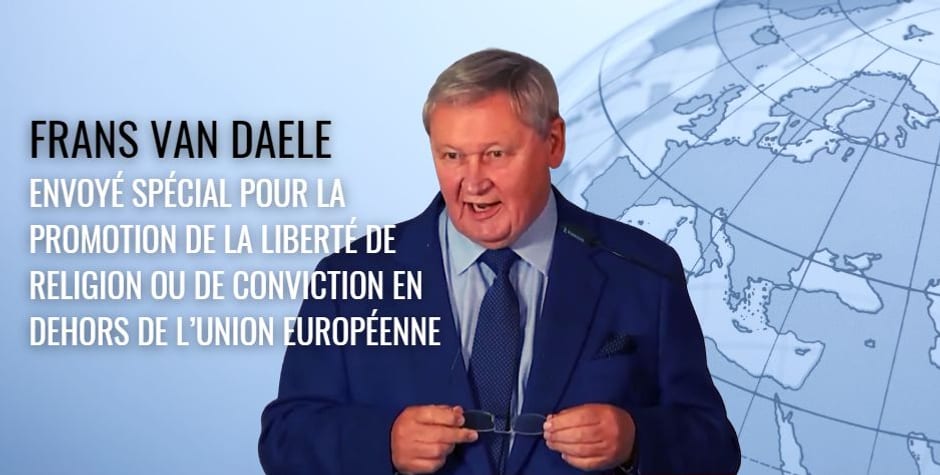

The ECLJ welcomes the appointment of Frans van Daele as special envoy for the promotion of religious freedom outside the EU
F. van Daele: SE for Religious Freedom
Frans van Daele was appointed on December 7, 2022 as Special Envoy for the promotion of freedom of religion or belief outside the European Union (EU). After a vacancy of more than a year, he succeeds Christos Stylianides, who remained in office for five months and was himself appointed in May 2021 after a two-year vacancy. These vacancies seem to demonstrate the lack of interest of the European Commission for this position founded in 2016[1]. However, in 2019, the first special envoy, Jan Figel, had played a crucial role in the release of Asia Bibi, sentenced to death and then detained for a long time for “blasphemy”, thus demonstrating the importance of his mission. The ECLJ, specialized in the defense of religious freedom since 1998, had collaborated in a very rich way with Jan Figel, it welcomes the appointment of Frans van Daele and hopes to support him in the same way in his mandate.
Frans van Daele is the former Chief of Staff of the King of Belgium, before which he had a long administrative and diplomatic career for more than forty years. He was in particular permanent representative of Belgium to NATO, ambassador of Belgium to the United States and ambassador and permanent representative to the European Union in Brussels. In a resolution of January 18, 2023[2], the European Parliament welcomed his appointment and asked the Council and the Commission to evaluate the mandate in order to provide him with sufficient human and financial resources. Finally, the Parliament recalled that “the Special Envoy’s duties should focus on promoting and protecting freedom of thought, conscience, religion and belief, and the rights to non‑belief, apostasy and the espousal of atheistic views”. I He stressed that the special envoy should also give particular attention to forced conversion, misuse of blasphemy laws and the situation of non-believers at risk (§22).
A January 15, 2019 resolution outlines the broad directions of the special envoy's mandate[3]. It states that “freedom of religion or belief implies the right of the individual to choose what to believe or not to believe, the right to change or abandon one’s religion and convictions without any constraints, and the right to practise and manifest the thought, conscience, religion and belief of one’s choice, whether individually or in community and whether in private or in public”. As part of his mandate, the special envoy could then investigate various issues such as the proportionality of restrictions on worship during the Covid or the situation of persecution experienced by many people who leave Islam. These are indeed fundamental issues as the resolution states, which “stresses that freedom of thought, conscience, religion and belief, as commonly referred to within the EU framework and in this resolution, as freedom of religion or belief (FoRB), is a universal human right, a value of the EU and an important and undeniable pillar of dignity, greatly impacting on all individuals, their personal identity and development and on societies”.
Today, the Member States of the European Union consider that the promotion of freedom of religion or belief is an element of international cooperation and development that should be supported by the European Commission and the Directorate General for International Cooperation and Development (DG DEVCO). It is a pity that the mandate only concerns situations outside the EU, which was a diplomatic condition required for the mandate to exist. The ECLJ regrets this situation and the reluctance of Member States to be open to any criticism that might be levelled at them. Nevertheless, there is much to be done outside the European Union, in particular in the framework of the European Neighbourhood Policy (ENP) and regional cooperation initiatives: the Eastern Partnership and the Union for the Mediterranean. Dans ce cadre, le mandat pourrait enquêter sur la situation du Maroc et de l’Algérie. ECLJ has already expressed alarm about the situation of Christian freedom in Morocco and had condemned the attacks of Algeria against the freedom of expression in religious matter by taking the defense of the Algerian islamologist Saïd Djabelkhir, sentenced on April 21, 2021 to a three-year prison term and a fine of 50,000 dinars for “offending Islam” and “denigration of the dogma” and “precepts of Islam” under article 144 bis 2 of the Algerian Penal Code punishing blasphemy.
The ECLJ reiterates its support to Frans van Daele in his mandate as Special Envoy for the promotion of freedom of religion or belief outside the European Union and wishes him every success in his mission.
_____________
[1] Created in 2016 by the President of the Commission in the wake of the Parliament's resolution of February 4, 2016.
[2] European Parliament resolution of 18 January 2023 on human rights and democracy in the world and the European Union’s policy on the matter – annual report 2022 (2022/2049(INI))
https://www.europarl.europa.eu/doceo/document/TA-9-2023-0011_EN.html
[3] https://www.europarl.europa.eu/doceo/document/TA-8-2019-0013_EN.html












